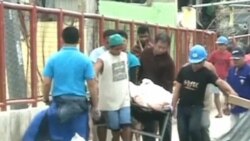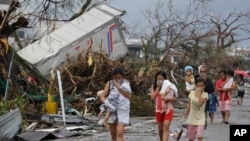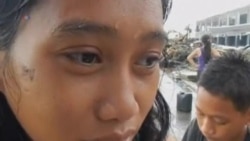One of the fiercest typhoons ever recorded has devastated the central Philippines, leaving entire cities and towns in ruins and as many as 10,000 people dead. After gashing six provinces, Typhoon Haiyan veered to the northwest into the South China Sea, and weakened to a tropical storm near the border of Vietnam and southern China.
Aid groups are struggling to reach the hardest-hit areas, where food and drinkable water are difficult to find.
The United States and several other countries are sending supplies and rescue personnel to the region. The first U.S. aid and military personnel flew on Monday from Manila to Tacloban, one of the worst-hit areas.
The aid effort is being hampered by looting, as mobs not only grabbed food and water from stores, but also took consumer items like TVs, washing machines and refrigerators.
The fast-moving storm slammed into Leyte Island from the east on Friday. By Sunday, as the scale of the destruction became clear, Philippine authorities said it is near certain the death toll will rise substantially.
President Benigno Aquino declared a region-wide state of calamity. Offers of help came from as far away as the White House.
In a statement Sunday, President Barack Obama expressed America's sorrow and pledged "significant" humanitarian assistance. U.S. military assets were deployed Saturday to assist in the search for survivors.
By early Monday, the storm began losing strength as it came ashore in Vietnam's northern Quang Ninh province. Forecasters expect it to weaken to a low depression later in the day in southern China, where heavy rain has begun to fall.
In hard-hit Tacloban city Sunday, a Philippine community of 220,000 residents, reporters saw scores of flattened buildings and corpses hanging from trees and scattered along roadways flooded by a 4-meter storm surge. Looters in the wrecked city foraged Sunday for food, water and fuel, as the government began relief efforts and international aid began to materialize.
Most other communities along the storm's path remained without communications.
The international aid group Doctors Without Borders prepared Sunday to deploy dozens of medical personnel and logistic experts to neighboring Cebu Island in the coming days, along with 200 tons of medical and relief items.
But the group's relief organizers, along with those from United Nations offices in Manila, said they expect access to the hardest-hit areas to be limited for days because of wrecked infrastructure and communications links.
At the Vatican Sunday, Pope Francis urged the faithful to pray in silence for the typhoon's victims. He said he feels close to the Philippines, and he urged church followers and others to offer generous assistance to those impacted by the huge storm.
More on Haiyan:
Aid groups are struggling to reach the hardest-hit areas, where food and drinkable water are difficult to find.
The United States and several other countries are sending supplies and rescue personnel to the region. The first U.S. aid and military personnel flew on Monday from Manila to Tacloban, one of the worst-hit areas.
The aid effort is being hampered by looting, as mobs not only grabbed food and water from stores, but also took consumer items like TVs, washing machines and refrigerators.
The fast-moving storm slammed into Leyte Island from the east on Friday. By Sunday, as the scale of the destruction became clear, Philippine authorities said it is near certain the death toll will rise substantially.
President Benigno Aquino declared a region-wide state of calamity. Offers of help came from as far away as the White House.
In a statement Sunday, President Barack Obama expressed America's sorrow and pledged "significant" humanitarian assistance. U.S. military assets were deployed Saturday to assist in the search for survivors.
By early Monday, the storm began losing strength as it came ashore in Vietnam's northern Quang Ninh province. Forecasters expect it to weaken to a low depression later in the day in southern China, where heavy rain has begun to fall.
In hard-hit Tacloban city Sunday, a Philippine community of 220,000 residents, reporters saw scores of flattened buildings and corpses hanging from trees and scattered along roadways flooded by a 4-meter storm surge. Looters in the wrecked city foraged Sunday for food, water and fuel, as the government began relief efforts and international aid began to materialize.
Most other communities along the storm's path remained without communications.
The international aid group Doctors Without Borders prepared Sunday to deploy dozens of medical personnel and logistic experts to neighboring Cebu Island in the coming days, along with 200 tons of medical and relief items.
But the group's relief organizers, along with those from United Nations offices in Manila, said they expect access to the hardest-hit areas to be limited for days because of wrecked infrastructure and communications links.
At the Vatican Sunday, Pope Francis urged the faithful to pray in silence for the typhoon's victims. He said he feels close to the Philippines, and he urged church followers and others to offer generous assistance to those impacted by the huge storm.
More on Haiyan:








